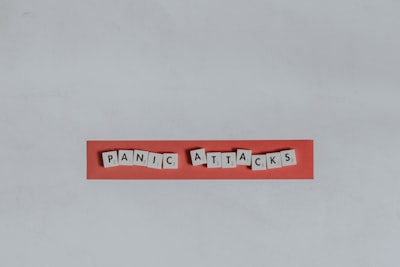Panic attacks can be overwhelming, leaving you feeling helpless and disoriented. Knowing how to calm down during these intense moments is crucial for regaining control and minimizing the impact on your mental and emotional well-being. This article provides actionable steps and insights to help you or someone you know calm down from a panic attack.
Download Raw
Photo by Pawel Czerwinski on Unsplash
What Are the Immediate Steps to Calm Down During a Panic Attack?
When a panic attack strikes, the first thing to remember is to focus on your breathing. Deep, slow breaths can help regulate your heart rate and provide a sense of control. The technique of “5 things to do to stop a panic attack” often starts with breathing exercises as the cornerstone.
Next, grounding techniques can be incredibly effective. This involves focusing on your senses to bring your attention back to the present moment. For example, you can touch something cold or focus on the sounds around you.
Lastly, if possible, remove yourself from the triggering environment. Sometimes a change of scenery can help you regain your composure and reduce the intensity of the attack.
- Breathing: Focus on deep, slow breaths.
- Grounding: Use your senses to bring attention back to the present.
- Environment: Change your surroundings if possible.
How Can You Help Someone Else Calm Down from a Panic Attack?
If you’re with someone experiencing a panic attack, your immediate goal should be to help them feel safe and understood. Use phrases like “You’re not alone; I’m here with you” to offer emotional support. This is crucial for “how to calm down a person with a panic attack.”
Additionally, encourage them to focus on their breathing and offer to guide them through grounding techniques. Your calm demeanor can serve as a stabilizing force for them.
Finally, avoid making judgmental or dismissive statements. The person is already in a heightened emotional state, and negative comments can exacerbate the situation.
- Emotional Support: Make the person feel safe and understood.
- Guidance: Help them with breathing and grounding techniques.
- Avoid Negativity: Do not make judgmental or dismissive statements.
What Are Some Long-Term Strategies for Managing Panic Attacks?
Long-term management of panic attacks often involves a combination of therapy, medication, and lifestyle changes. Cognitive Behavioral Therapy (CBT) is particularly effective for understanding the triggers and thought patterns that lead to panic attacks.
Regular exercise and a balanced diet can also contribute to better mental health, reducing the frequency of panic attacks. Mindfulness and meditation techniques can further help in managing symptoms.
Additionally, it’s essential to have a support system in place. Friends, family, and mental health professionals can provide the emotional and psychological support needed to manage panic attacks effectively.
- Therapy: CBT is effective for understanding triggers.
- Lifestyle Changes: Exercise and diet can contribute to better mental health.
- Support System: Having a strong support system is crucial.
Summary Table
| Key Points | Summary |
|---|---|
| Immediate Steps | Focus on breathing, use grounding techniques, and change the environment if possible. |
| Helping Others | Offer emotional support, guide them through breathing and grounding techniques, and avoid negativity. |
| Long-Term Strategies | Consider therapy, make lifestyle changes, and have a strong support system. |
FAQ
What are the immediate steps to calm down during a panic attack?
Focus on deep, slow breaths, use grounding techniques, and change your surroundings if possible.
How can you help someone else calm down from a panic attack?
Offer emotional support, guide them through breathing and grounding techniques, and avoid making judgmental or dismissive statements.
What are some long-term strategies for managing panic attacks?
Consider therapy like CBT, make lifestyle changes such as regular exercise and a balanced diet, and ensure you have a strong support system.
How does mental health relate to panic attacks?
Panic attacks can be a symptom of broader mental health issues, such as anxiety disorders or schizophrenia.
Can social media trigger panic attacks?
Yes, excessive use of social media can contribute to anxiety and panic attacks. Read more about it here.
How does emotional health differ from mental health in the context of panic attacks?
Emotional health focuses on managing emotions, while mental health involves a broader range of psychological well-being.
Can a panic attack lead to a mental breakdown?
Yes, frequent and severe panic attacks can contribute to a mental breakdown.
What part of the brain is involved in panic attacks?
The amygdala, a part of the brain involved in emotional responses, plays a significant role in panic attacks. Learn more about the brain’s role in emotions here.
Are there medications for treating panic attacks?
Yes, medications like antidepressants and anti-anxiety medications are often prescribed for treating panic attacks.
Can lifestyle changes help in managing panic attacks?
Absolutely, regular exercise, a balanced diet, and mindfulness techniques can help in managing panic attacks effectively.
By understanding the immediate and long-term strategies for calming down from a panic attack, you can better manage these overwhelming moments and lead a more balanced life.


